How to Draw a Soviet Soldier
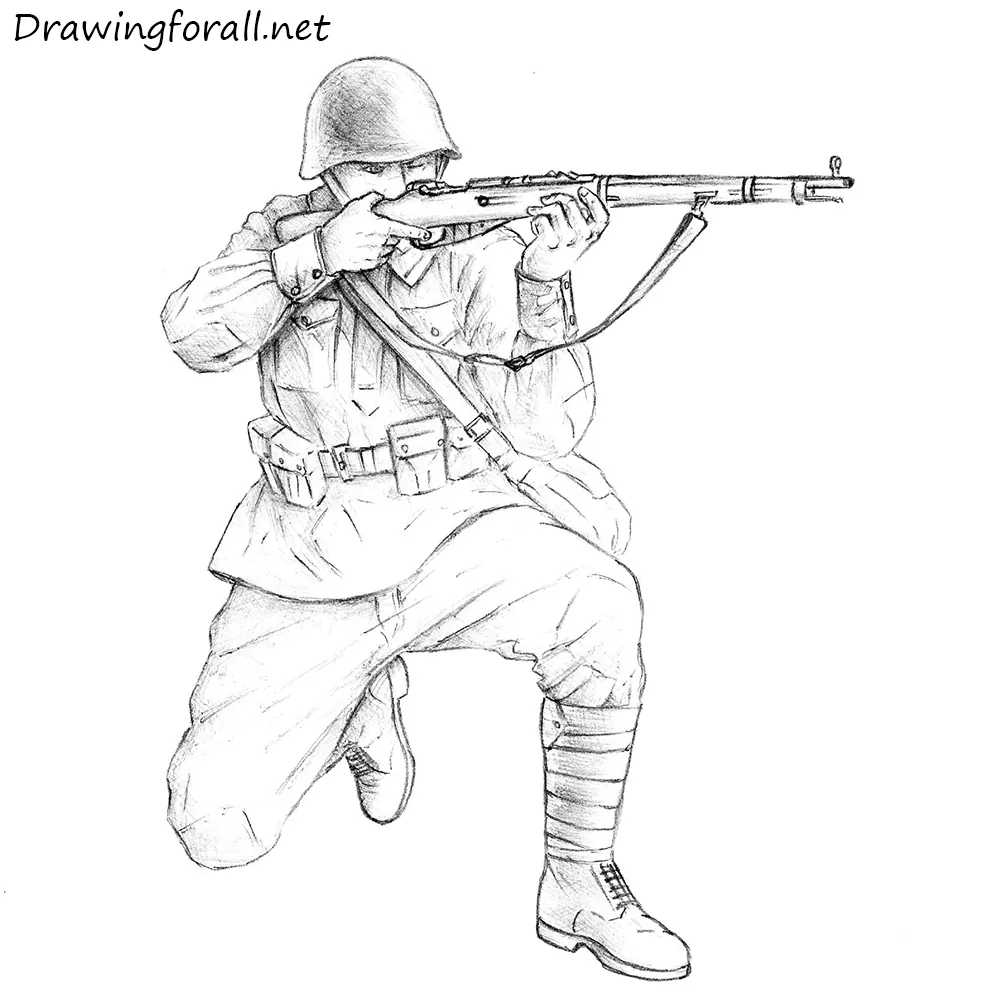
Hello! In today’s lesson we’ll show you how to draw a Soviet soldier.
Step 1
This lesson is quite complicated but we begin to draw with a very simple stickman – man made of sticks and circles. Before you start drawing stickman remember the basic rules of human body proportions:
- height equal to the sum of the lengths of approximately 7 heads;
- 3 of them fall on the body (from the neck to the waist);
- and 4 – on legs.
However, be extremely careful at this stage, because the soldier is not worth a full-length (such as a doctor in one of our lessons), and occupies a position just before the shot.
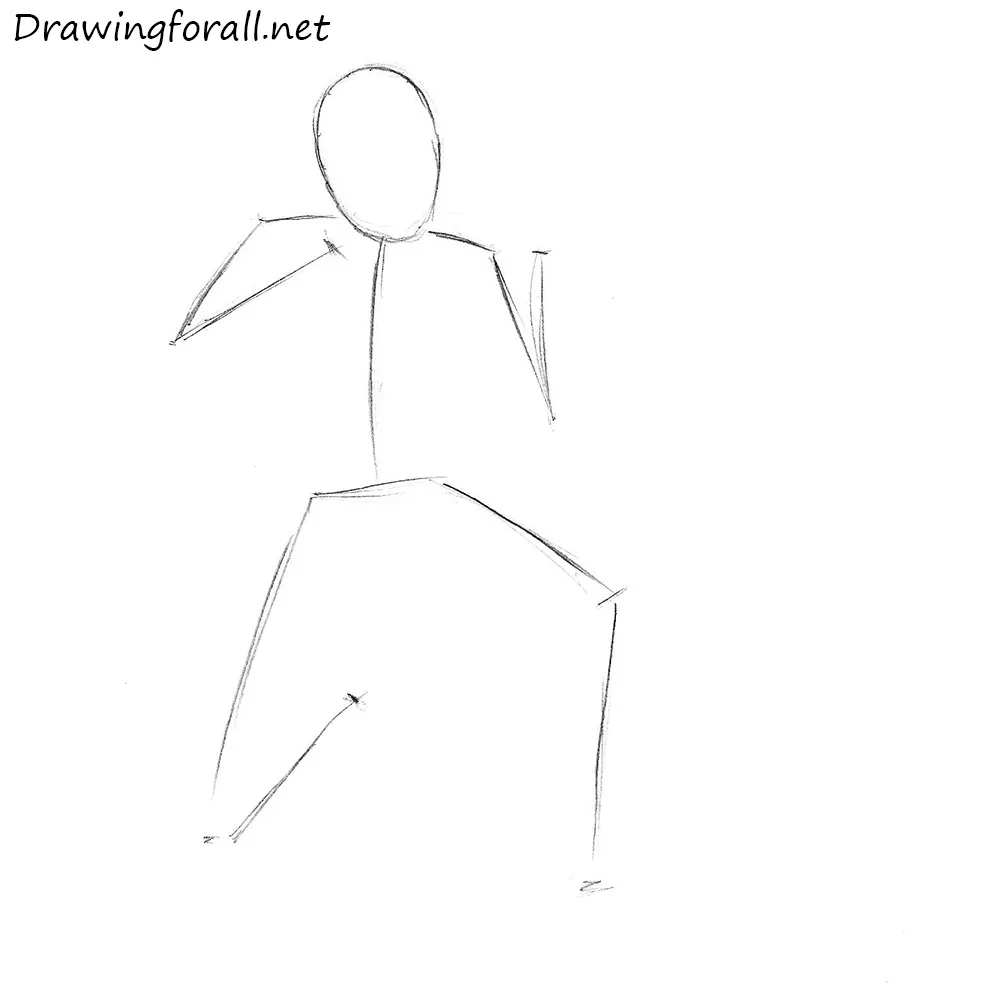
Step 2
Now we work a little over the top part of the soldier. At the top of the head draw helmets line, mark up the rest of the lower part of the two lines – vertical, which will denote the facial symmetry (note, it is slightly beveled for transmitting head tilt) and the horizontal line of the eyes. Also, draw a part of the helmet and sketch out the silhouette of the weapon of a soldier in the hands (the stock should cover the lower part of the face). Sketch out the rectangular guides for the hands, and move to the third step.
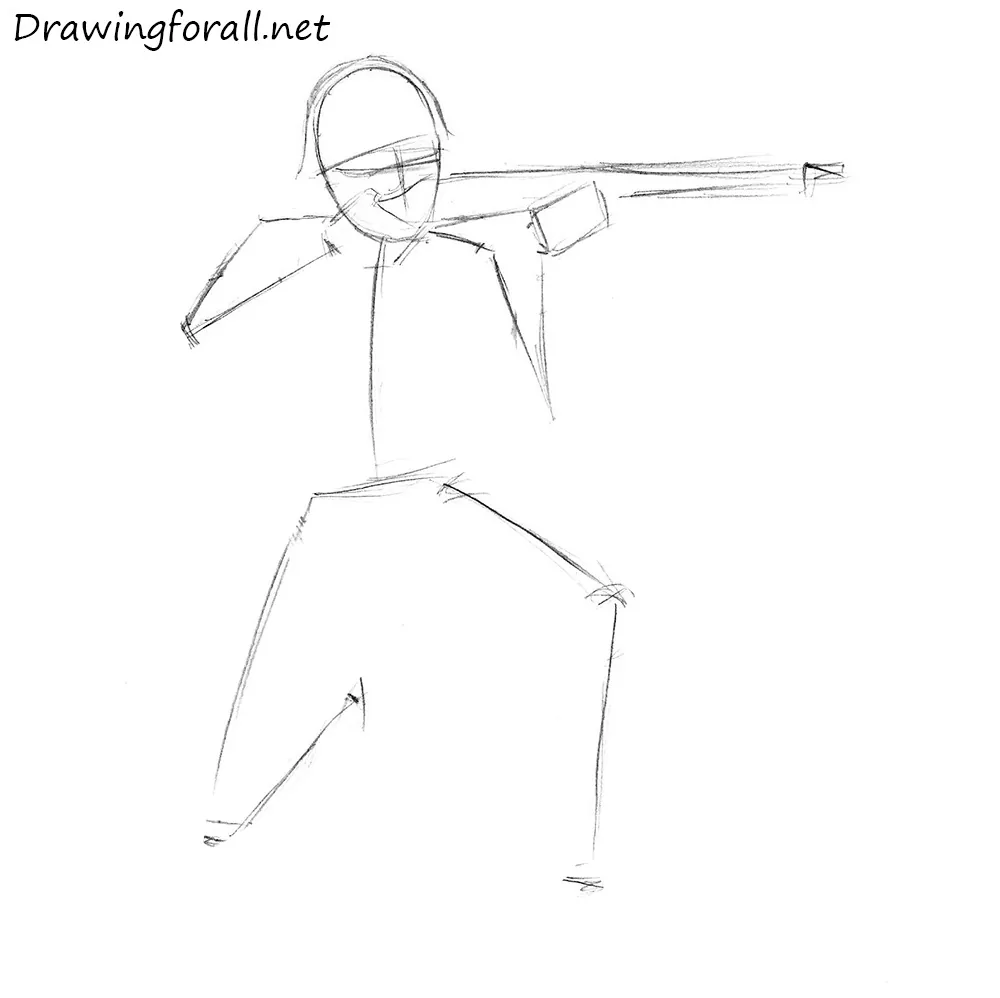
Step 3
We attach the volume to the arms and upper body. In fact, at this stage we just circle previously planned line. Use shapes, similar to cylinders to sketch out the arms.
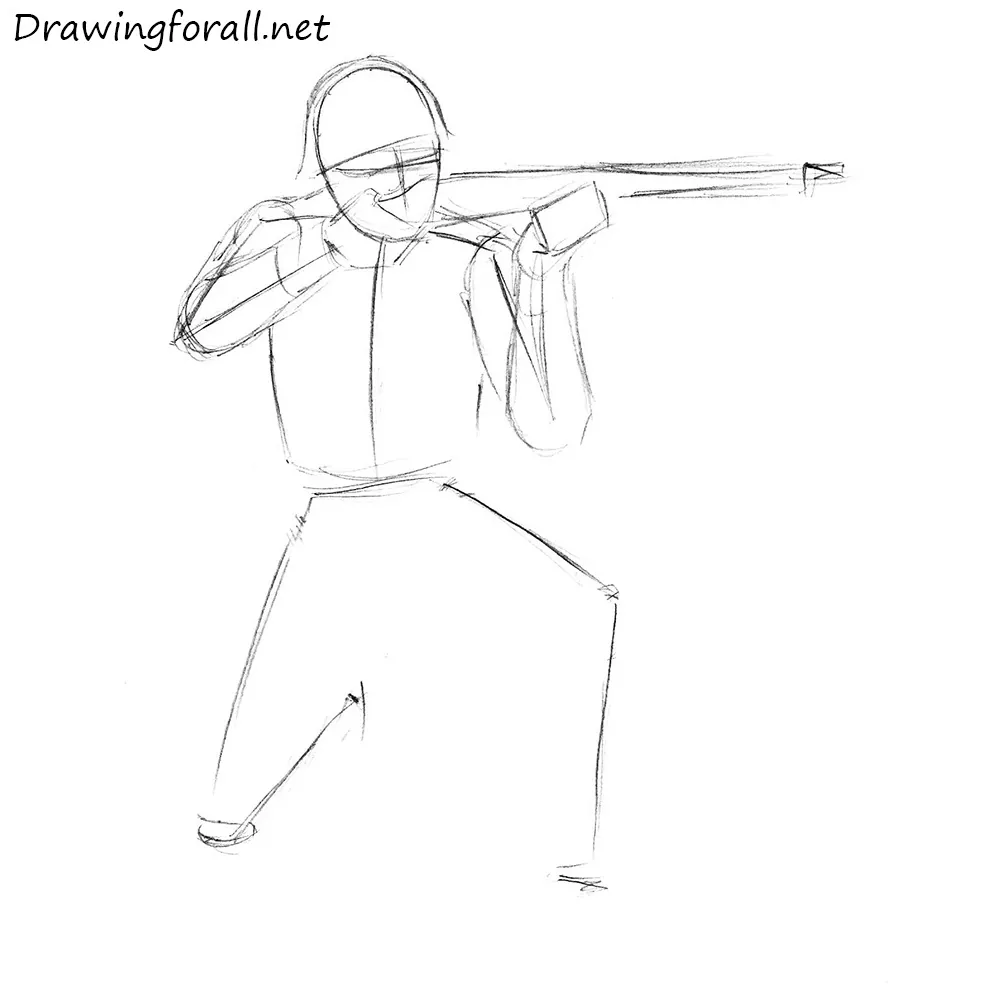
Step 4
Now do the same operation with the lower part of the torso. It will be much easier to implement if you present parts of the body in the form of simple figures – belt and groin in the form of a triangle, legs – in the form of cylinders, the knee joints in the form of a circle and a flattened oval. Again, nothing fancy, since no anatomical rendering of muscles and tendons from us.
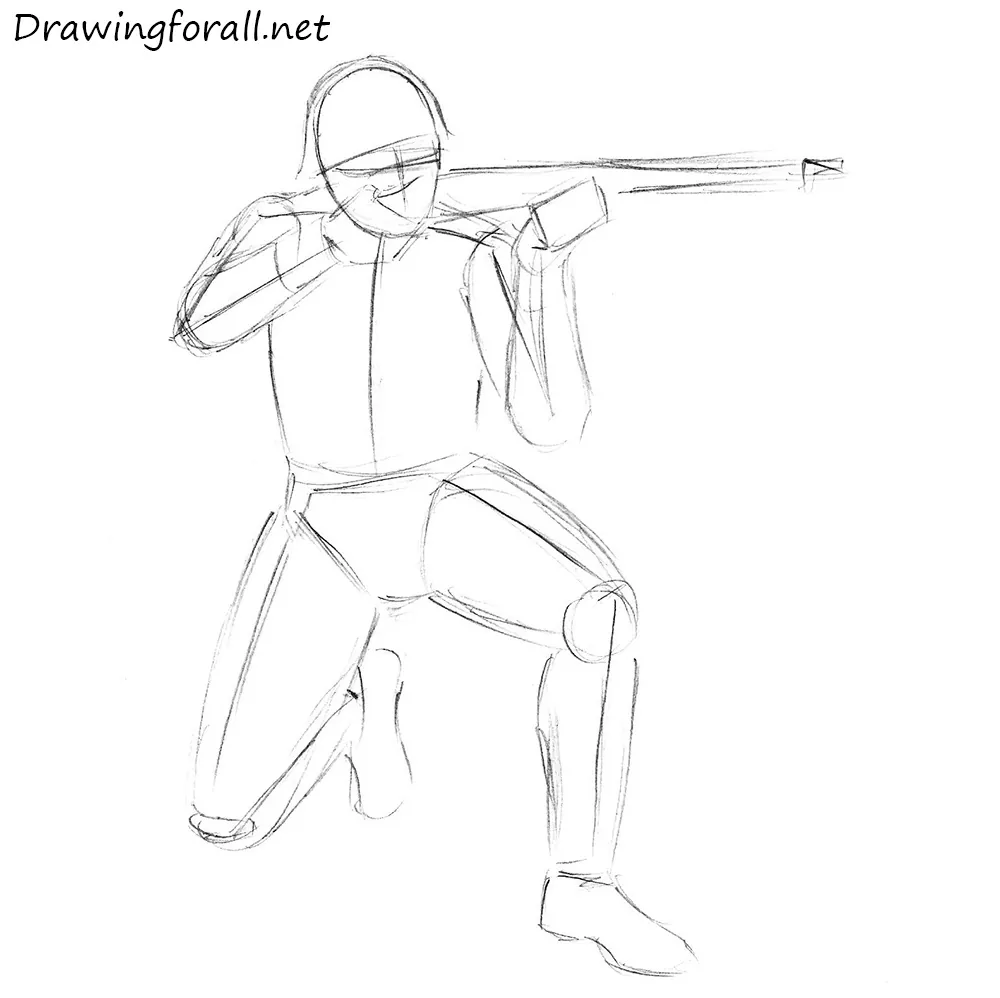
Step 5
“Volumetric stickman” ie silhouette of the soldier is ready, you can start adding details. If in doubt about the accuracy of the location of the soldier or the proportions of his body, bring a sketch of the stage to the mirror and look at the reflection – in it all the errors will be very catchy and noticeable.
And now, in fact, continue the drawing lesson on how to draw a soldier of the red army. Delete the extra guidelines from the helmet and circle its contour, also, draw the strap on the soldiers cheekbone. Then draw the eyes – one of them must be narrowed.
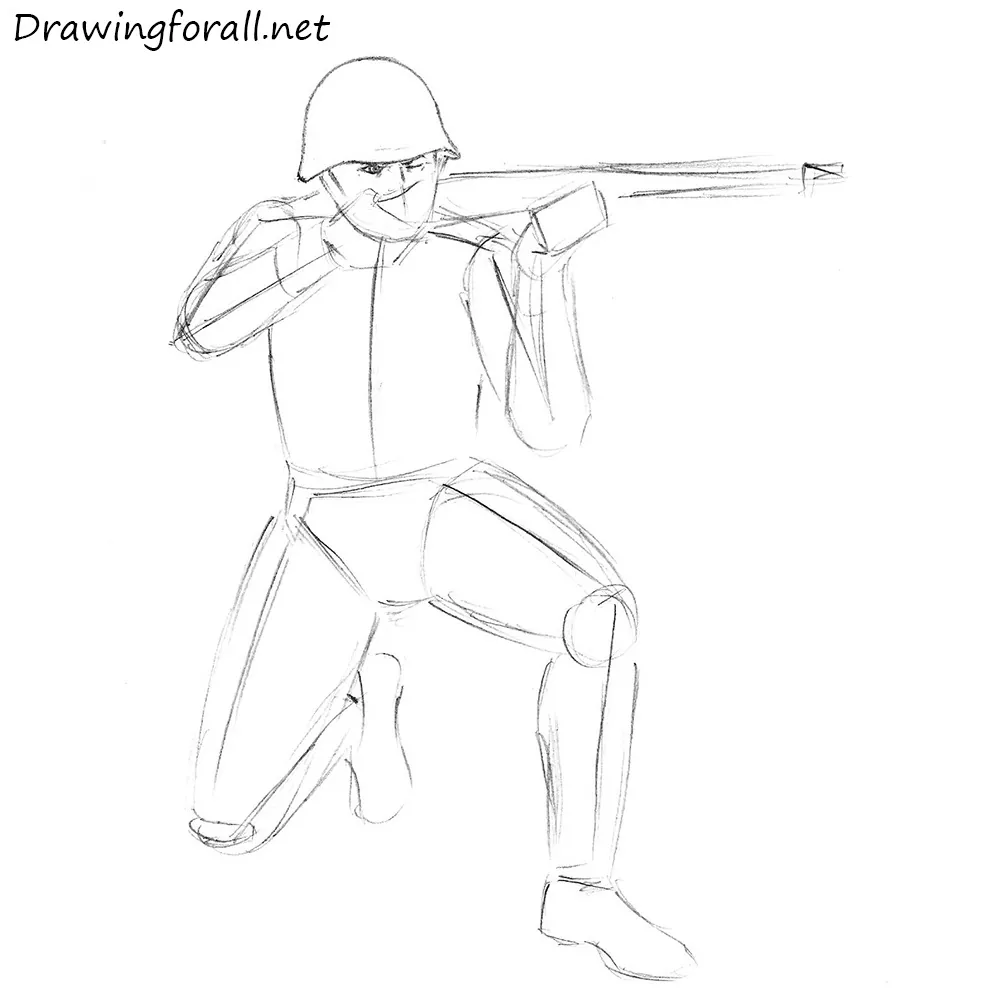
Step 6
Let’s start drawing details from the top down ie, in the direction from the head to the feet. We work on the clothing. Draw the sleeves, outline folds of fabric and cuffs. Then denote strap that goes through all the body diagonally, collar and touches that subsequently become large pockets located on the chest. Using short strokes, divide the fingers, as in the example.
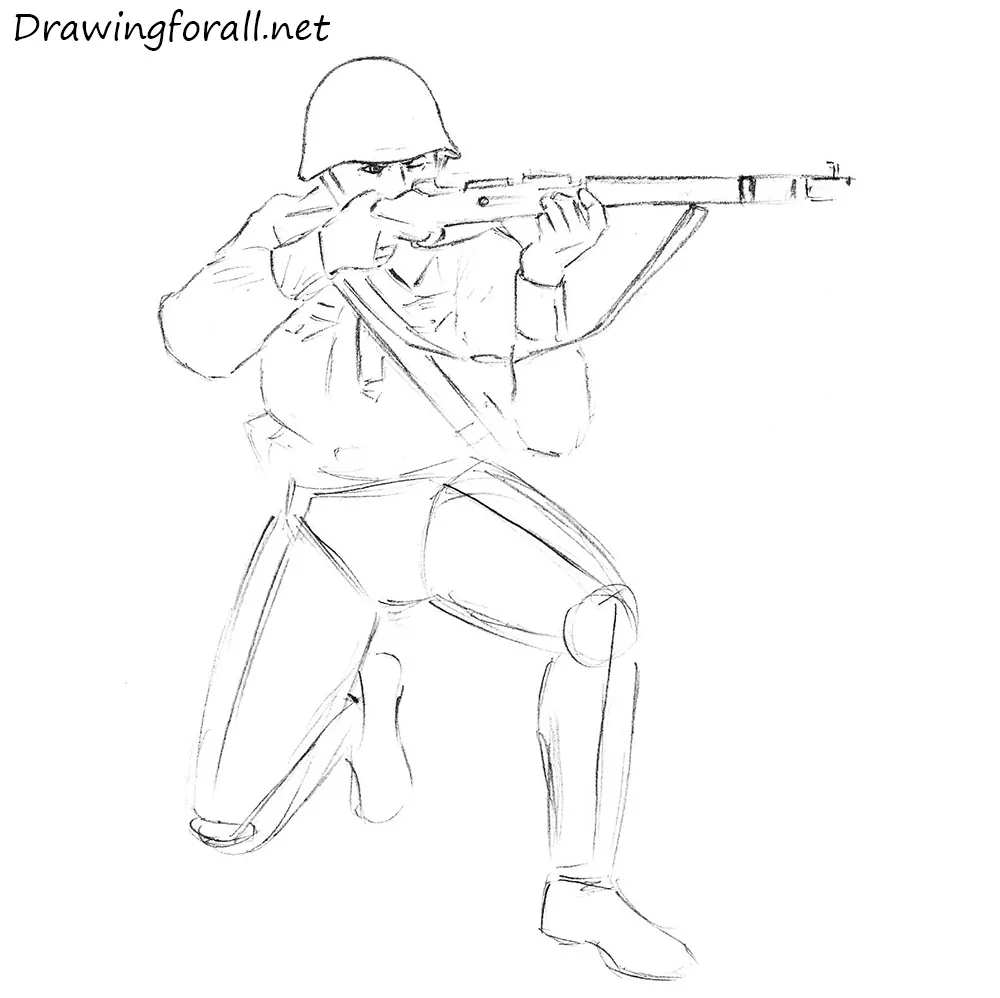
Step 7
Go down below and draw the lower torso and legs soldier. First, draw the strap and side pockets, and then – a bag and freely lying bottom of the jacket First, draw the strap and side pockets, and then – a bag and freely lying bottom of the jacket (note the smooth bend of the line of Soldier’s jacket in the area closest to our leg, it must indicate his posture). Next – the legs. Erase extra guidelines, circle the contours of the leg – do the contour slightly wavy and draw wrinkles on the fabric. Yes, such a feature – the legs should be very voluminous, again to emphasize the free cut pants.
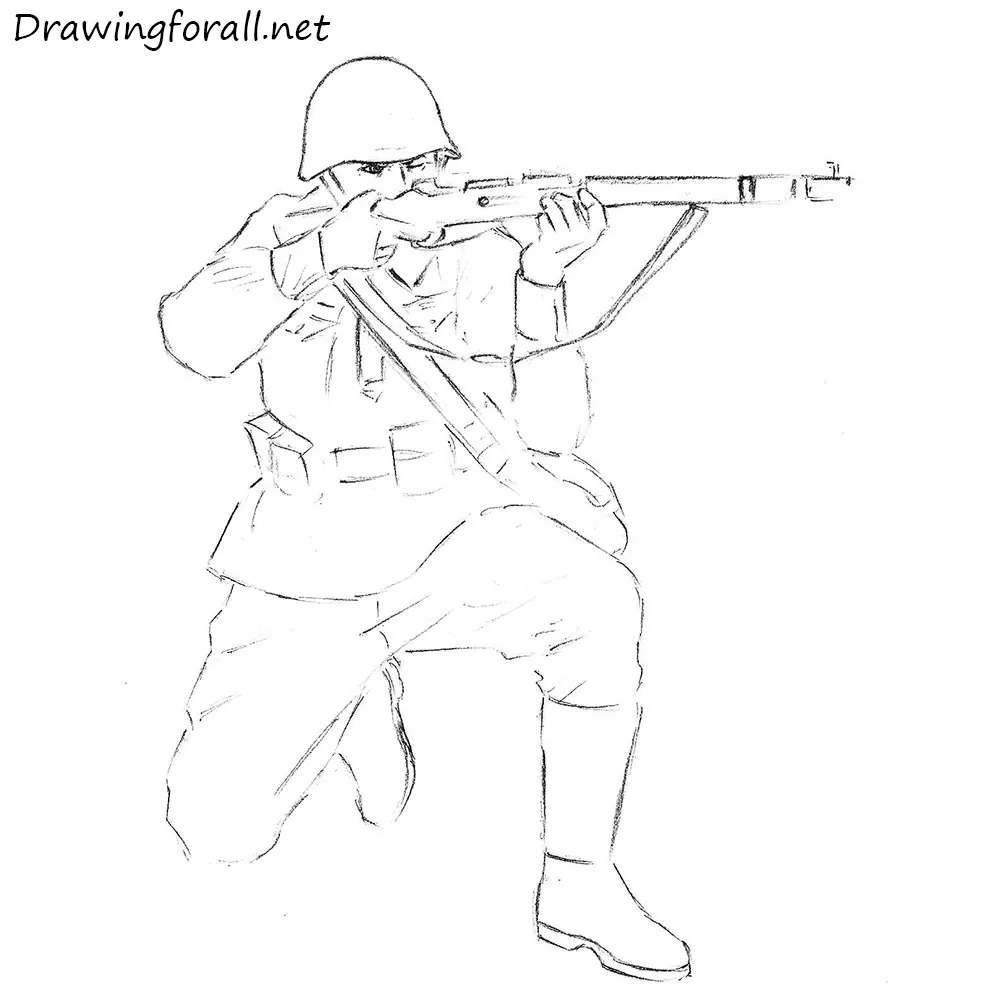
Step 8
Well, already very close to what we need. Let’s add more details to the soldier. At this stage, we thoroughly detail the right arm the warrior and the edge of the rifle buttstock. Look carefully at our sample and try to repeat our actions in your drawing – always draw such seemingly inconspicuous details like elbow patches, edging collar, buttons and folds. Draw the knuckles on the outside of the hand.
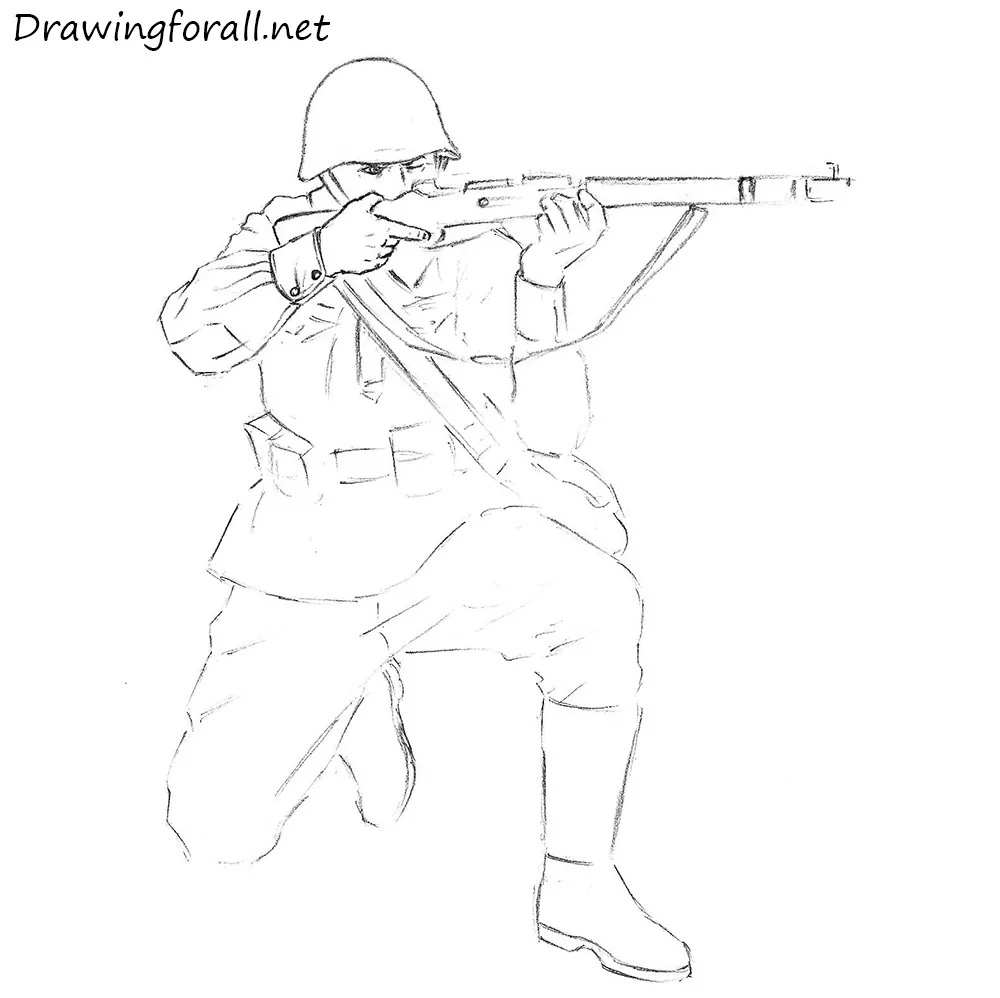
Step 9
Now repeat the same operation, but on the other arm. Here only, in contrast to the previous stage, we can see nails on the fingers and we will need to designate them. Also, mark the phalanges, but otherwise all the same – cuffs, buttons, patch in the elbow area and folds.
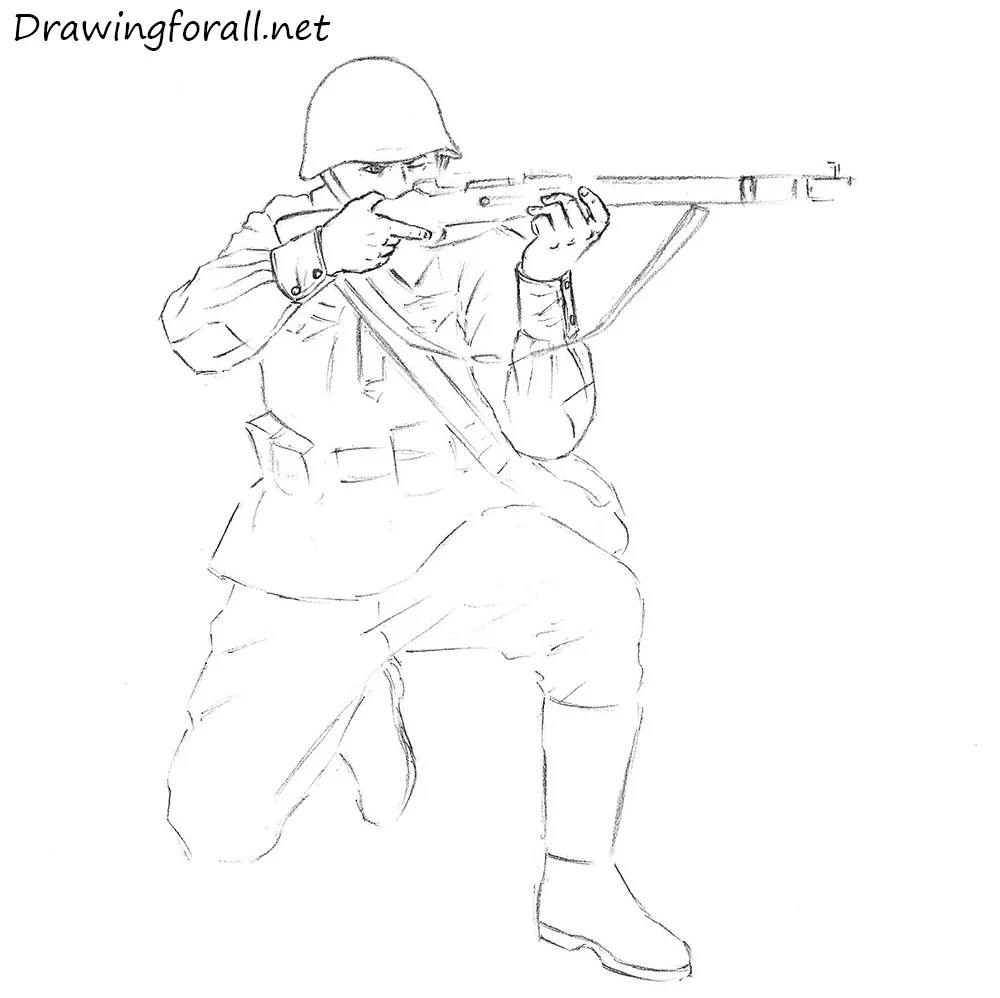
Step 10
Draw the Mosin rifle. Do not forget that most of the parts of the gun barrel was made of wood, to visually convey the material, draw some lines along the trunk in the front part. Also, draw the short horizontal lines running across the barrel – the first of them is located near the front sight, and the last – in the area of the left hand. Draw sight, trigger and a belt (note the belt buckle and inverted position).
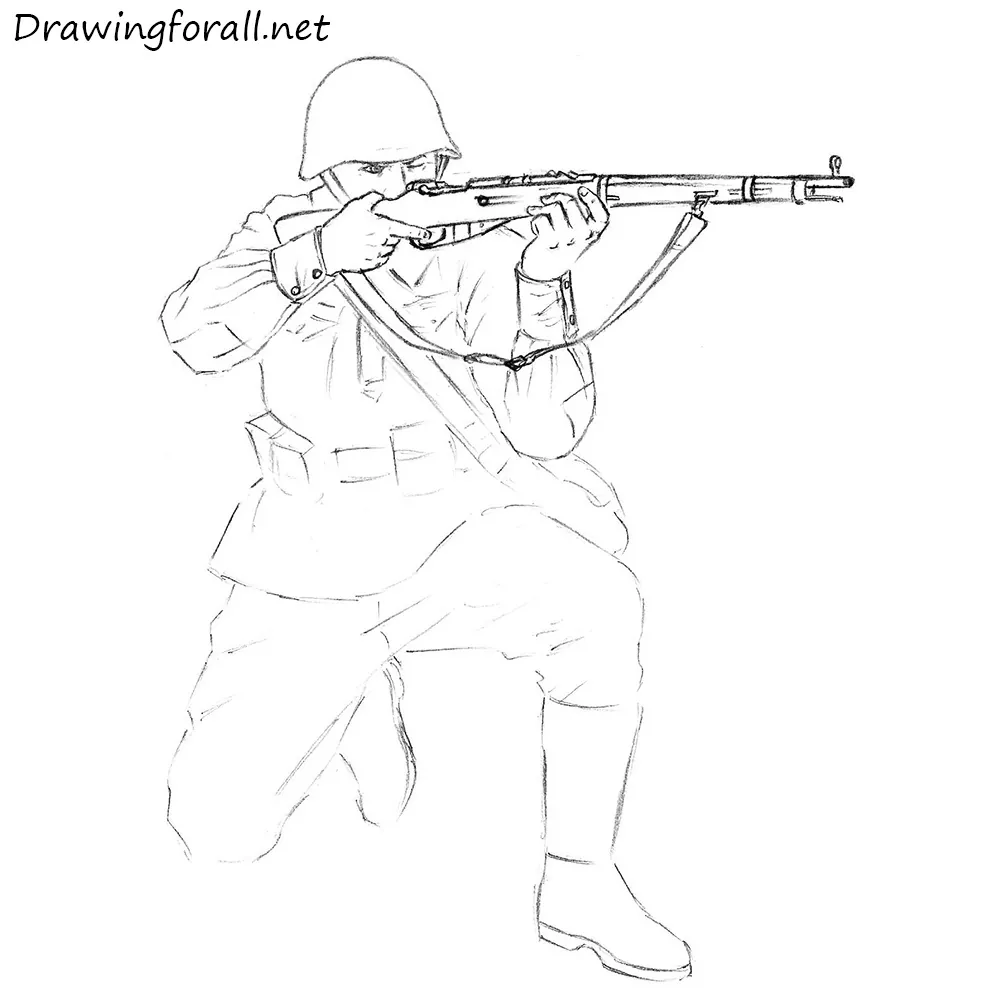
Step 11
Detailing the torso. Draw stripes on the collar, the horizontal line of fasteners and pockets. Note the frame, which is located at the edges of the pockets and folds running from the belt. Do not forget to draw the bag and belt buckle. Next, draw the strap (the one that is located in the belt of a soldier), and belt buckle pockets. Add short and smooth folds to the bottom of the jacket, as in our example.
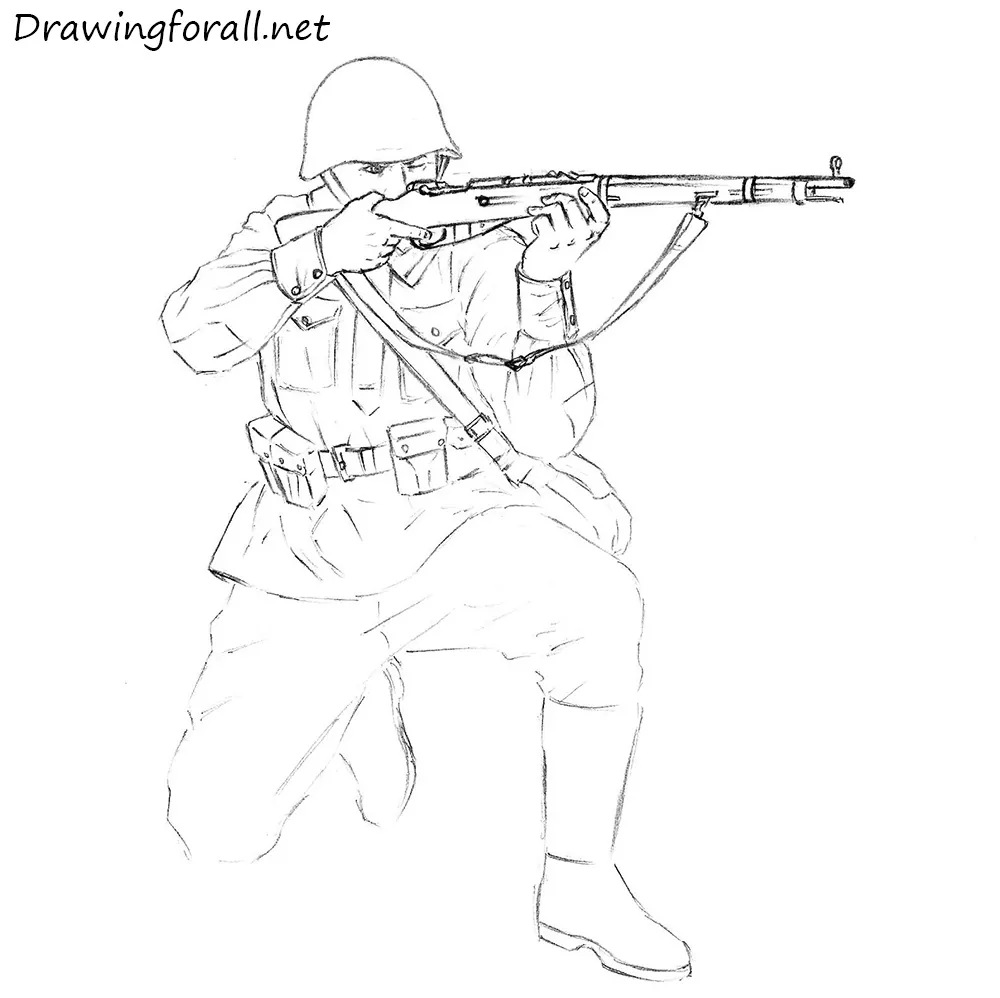
Step 12
Draw the legs, start with the right one. Circle it, keeping the previously scheduled wavy contour, draw the line of his pants, mark a rectangle in the knee area and draw boots on a thick, rough-soled shoes. Add some folds on the boot.
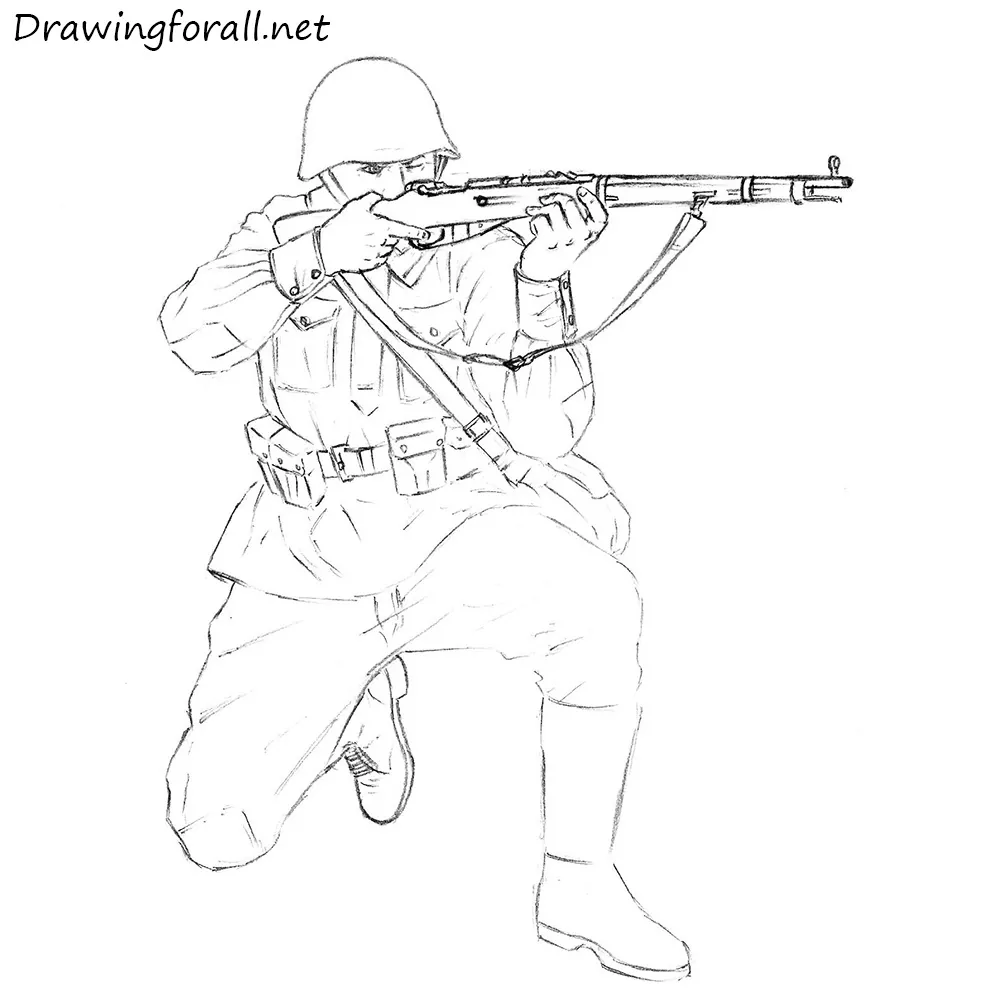
Step 13
Now we detail the other leg. Circle it, mark the folds, draw a strip of cloth in the region of the lower leg. Draw a thick sole of the shoe, draw the lacing and a pair of strokes on the material of the shoe, which will be denoted by the folds.
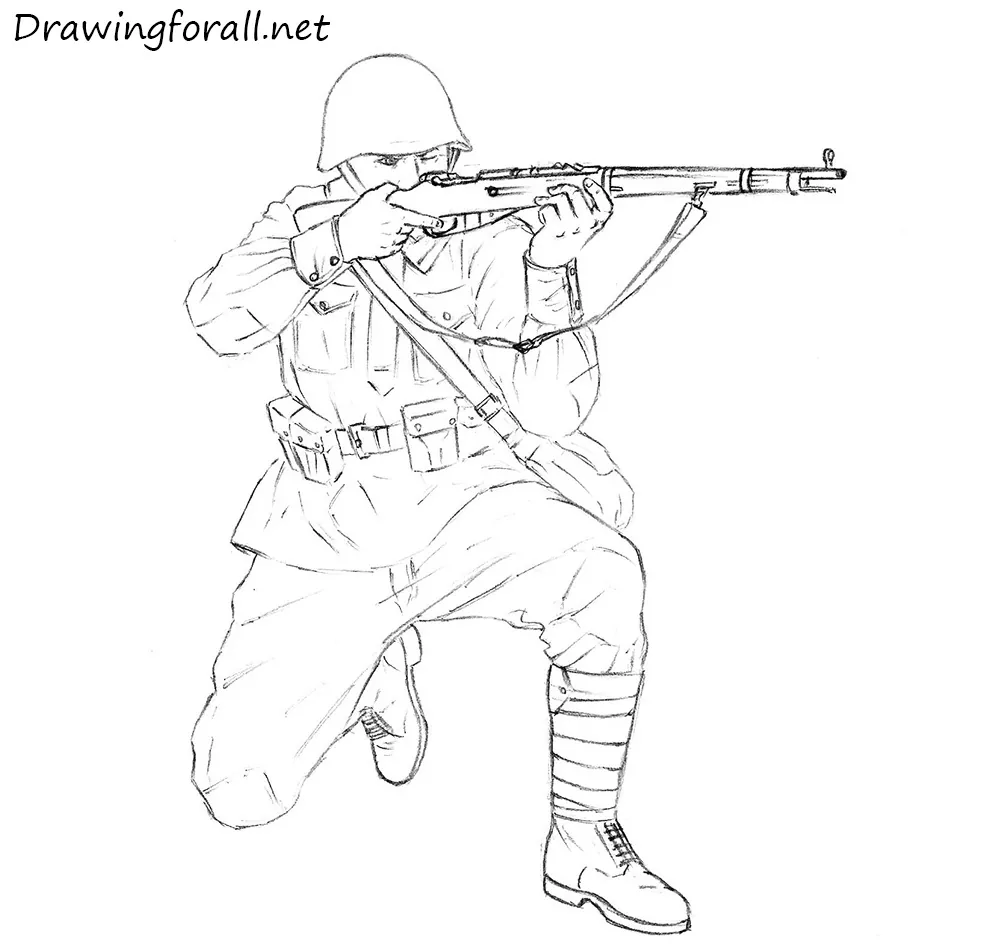
Step 14
Not bad goes, is not it? Let us now try to add the shadows. First, apply a shadow on our soldier’s helmet. Before you start, do not forget to see the 6th stage of the lesson on how to draw grapes – firstly, there is described the structure of realistic shadows, and secondly, a shadow on the bunch of grapes is very similar to a shadow that lies on a soldier’s helmet from this lesson.
Before applying the shadow, determine the location of the light source – the light falls on the front of the soldier, the source is located approximately at the height of its growth, and comes from the right side of us.
Add shadows using light and smooth hatching. Do not forget to designate a strip of light reflex, which is located on the edges of the helmet.
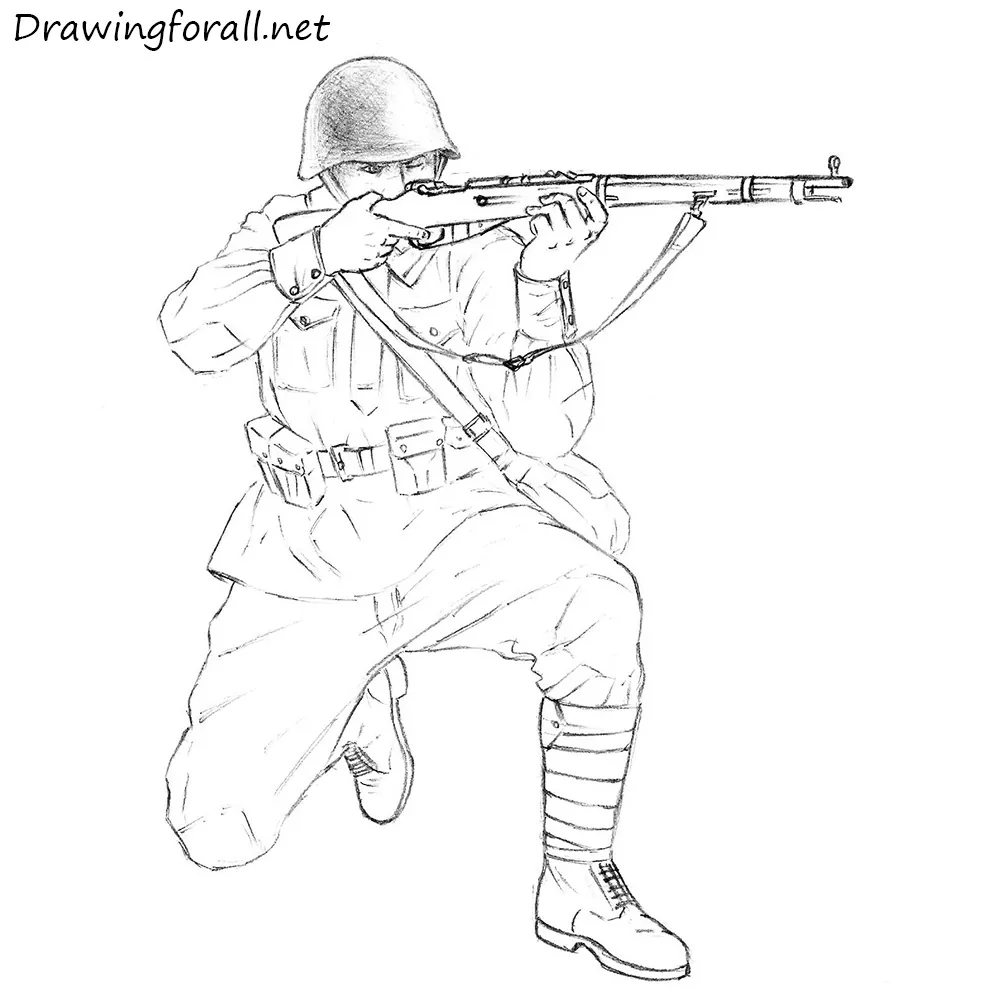
Step 15
Apply shadow to the right hand. Note that almost every fold drops an easy shade, but in the area of the deltoid and trapezius muscle shadow is especially thick.
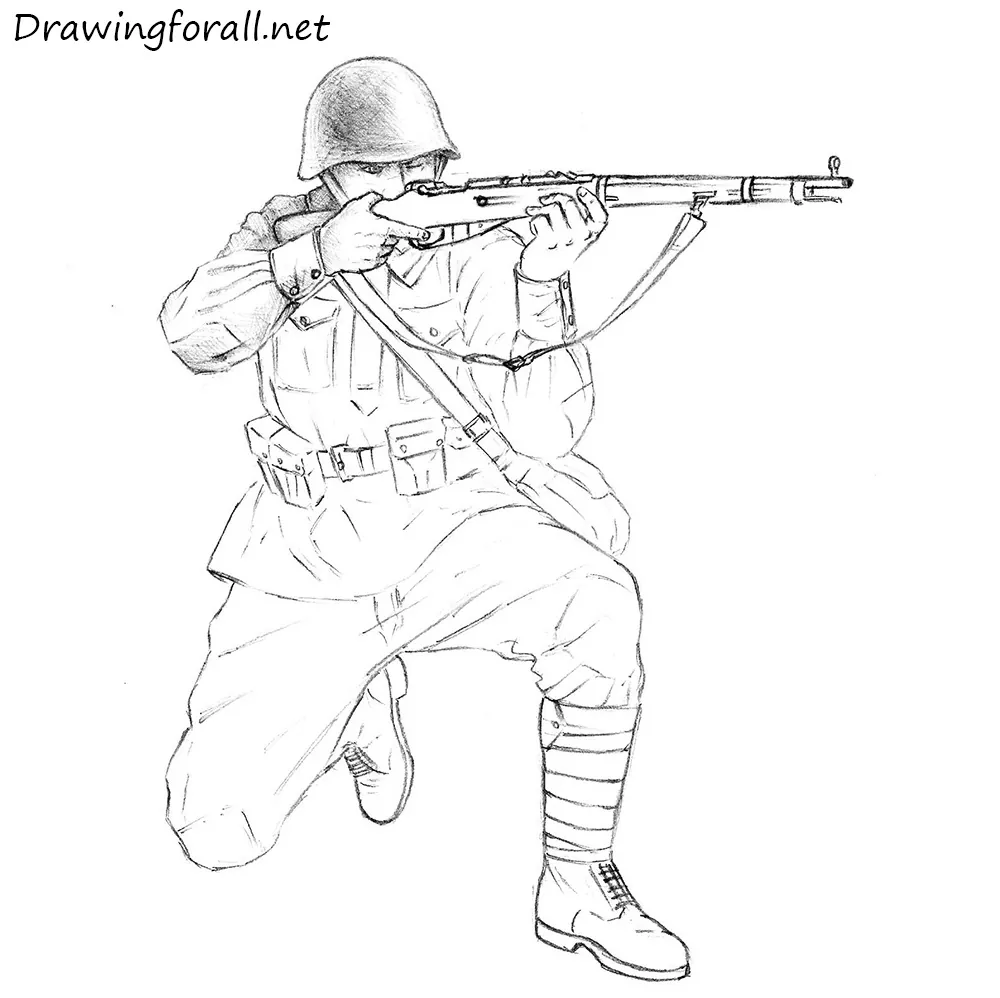
Step 16
Using light cross hatching denote the shadows on the body, increasing the number of layers in the most densely shaded areas.
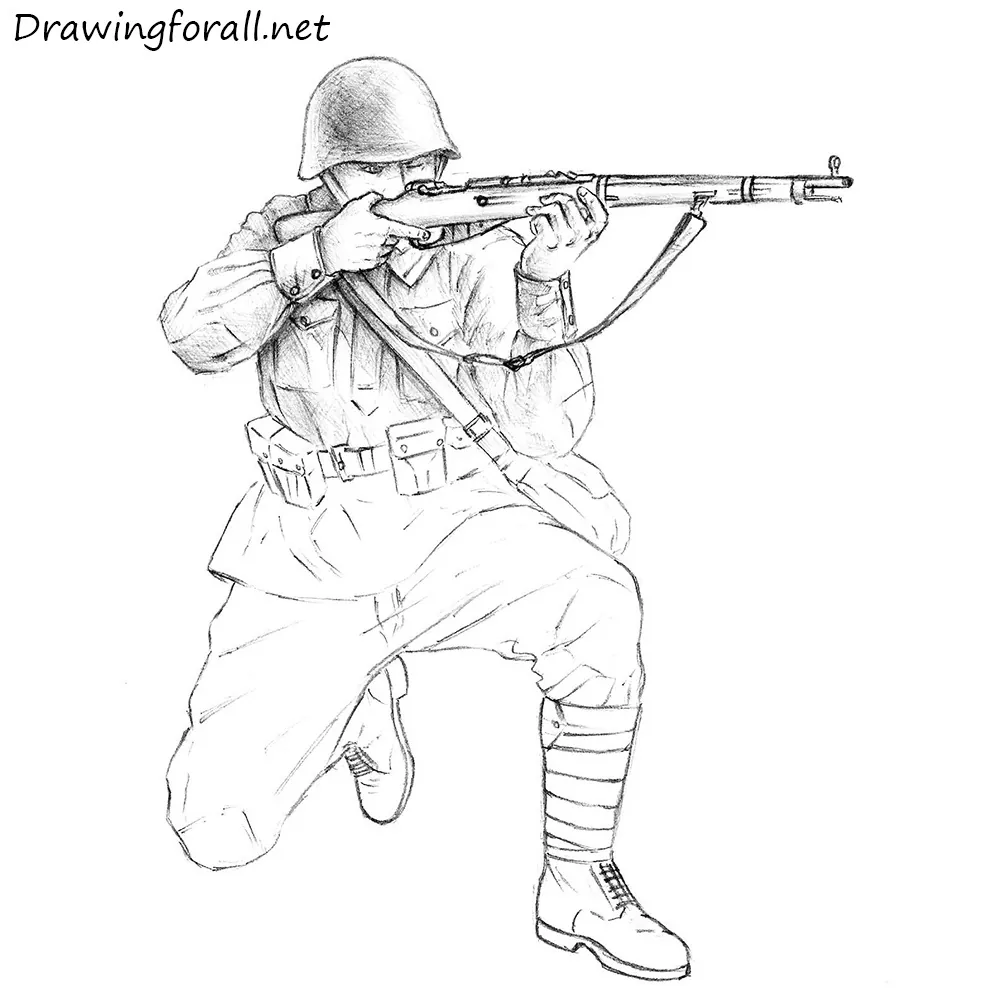
Step 17
Actually, it remains to apply shadow to the legs and our drawing is ready. Add shadows, as in the previous steps – use light and smooth hatching of different layers.

It was a lesson on how to draw a Soviet soldier by Drawingforall.net. Come to us for new lessons and write in comments about your wishes. Goodbye!


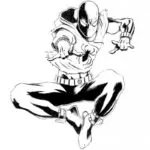
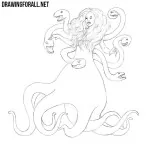
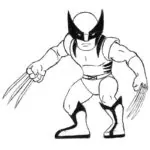
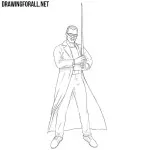
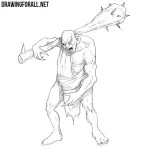
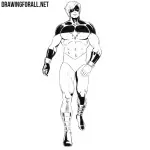
this is a helpful website as it teaches you the skills.
the more you practice you get better at it
never give up
SO HARD! I GAVE UP!
I found it easy to be honest
How did you give up Friend?
Wat thee elll I was doing it for 3 hours and I done it
Thank you soooo much! I love this drawing tutorial. Now i know how to draw a soviet soldier.
Super hard not much info
So easy
So simple
Good website will recommend to everyone
Not glitchy
Dis is hard
Perfect!
This is so god damn hard i couldn’t even do step 1
To be fair this is some hard bull sh but it’s worth it
how do you even draw the hands? That was the hardest part. and how do you even draw the guns?
trace it
Thanks a lot!!! I can draw it all,but i bad to draw at part of a ton colour!!
that is not a sovet its german
Bro this easy just put the paper over the screen XD finished it in about 10 minutes.
Lol my class mate in junior high could do it